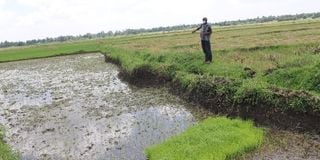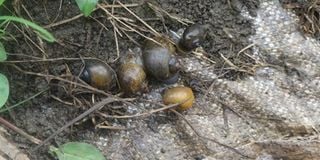Apple snails causing Kenya's basmati rice to lose its aroma, study reveals

A farmer in Mwea, Kirinyaga County, shows a rice paddy damaged by apple snail. Pool/ CABI
Kenya's basmati rice is on the verge of losing its aroma due to the invasion of rice farms by apple snails.
A study conducted by the Centre for Agriculture and Bioscience International (CABI), a UK-based nonprofit inter-governmental organisation for scientific research and publishing on agriculture and the environment in the Mwea Irrigation settlement scheme in Kirinyaga County, reveals the pest is wreaking havoc on the rice fields.
CABI, under the Plantwise Plus programme, collaborated with the National Irrigation Authority (NIA), Mwea Irrigation Agricultural Development (MIAD) and the Kenya Plant Health Inspectorate Service (KEPHIS) and conducted a socio-economic survey among different players in the rice production sector in Mwea.
Invasive snail
The study sought to investigate the presence and quantify the impacts of the pest scientifically known as Pomacea canaliculata as well as to find out apple snail management practices currently employed by individual farmers.
The research report was compiled by Fernadis Makale, a Research Officer who is a specialist in Invasive Species Management at CABI and Harrison Rware, monitoring, evaluation, and impact assessment specialist with experience in the development and research of agricultural value chain for Africa at CABI office in Kenya indicates that the invasive pests are a big threat to rice production in Kenya's rice basket region.

Apple snail eggs (pink) in Mwea, Kirinyaga county.
According to the report dubbed, "Why the invasive apple snail is causing Kenya's basmati rice to lose its sweet smell of productivity", the invasive pests may affect production in the 30,000 acres scheme out of which 22,000 acres have already been developed for paddy rice production.
"Despite a recently reported increase in production by 44 per cent due to enhanced mechanisation, increased cropping intensity, and increased area under production due to enhanced on-farm irrigation water management, this is under threat due to the presence of invasive pests," said the report.
According to the report, one of the invasive pests in Kenya is the golden apple snail which was first reported in Kenya at the Mwea Irrigation scheme in 2020 by CABI scientists.
Golden snail
Extension workers, agro-dealers and farmers, reported the first case of apple snail invasion in Kimbimbi in 2020.
The source of the pests is not clear but multiple accounts exist on the invasion route and most extension officers and media reports state that the apple snail was introduced by researchers from a local university as a rice weed biocontrol.
The pest has, since its discovery, spread to over 90 per cent of the scheme and out-growers and is still spreading as a result of equipment lending and water flow in the canals.
"Infestation levels of over 50 per cent have been reported in some units of the scheme started in 1954 with about 65 acres and is affecting rice and other crops such as arrowroots," said the report.

Apple snail was confirmed present in Kenya by the Centre for Agriculture and Bioscience International (CABI) in the Mwea Irrigation settlement scheme in Kirinyaga County in 2020.
The report states that the impact of the pest is now causing more pain to farmers as they have reported an increase of about 10 percent of labour and production costs – mainly hiring of labour for handpicking, management practices application and replanting.
Crop damage
"Farmers in the scheme have also reported crop damage of around 50-80 per cent with more damage reported in the direct seeded crop and newly transplanted rice," added the report.
The report stated that pest management has almost doubled farmers' production costs, especially on labour, purchase of plant protection inputs and replanting.
"On average a total of Sh20,000 per hectare for pest management has been introduced – especially on labour for collecting and crushing snails – eating into the farmers' profit," read the report.
According to the report, over 60 per cent of the problems that farmers present to the extension agents and 73 per cent of farmers who visit agro-shops look for apple snail management solutions.
"There is no particular remedy that is formalised to manage apple snails. Therefore, the only advice they [agents] give to farmers is draining off the water canals and paddy fields to expose the snails to harsh conditions and other predators," said the report.
The extension agents have suggested a raft of recommendations to deal with the pest, including creating barriers in feeder lines to trap the snails, alternate wetting and drying, draining the paddy fields, cleaning canals, handpicking and physical crushing of the snails and eggs.
Levelling the field and fallowing are also recommended along with the banding as well as digging furrows at the end of the farm so that the water in the furrows traps the apple snails.
However, the report says that despite these efforts, the apple snail problem is still spreading saying, "it is a situation that calls for urgent and joint efforts from all players to contain the problem before it spreads to other rice irrigation schemes in Kenya and the region."
Birds and rodents
In the past birds and rodents were ranked highly as pests in rice production but the emergence of the apple snail has recently posed threats to total income from rice farming as the pest effects start right at the nursery level.
The farmers say the available management options are proving to be insufficient and ineffective in tackling the pest.
According to the report, the farmers are willing to take up remedies that are safe for them and the environment. This willingness forms a good entry point for introducing safe and sustainable solutions for apple snail management.
"Farmers also are using insecticides and fungicides in the management of apple snails but are ineffective even at higher doses. Some farmers reported using rabbit urine as this is thought to have the dual benefit of plant nutrition," added the report.
The study suggested that there is a need for urgent and joint actions from all the stakeholders in providing a sustainable solution to apple snail infestation.
The report called for the training of extension agents and exposure to the available technologies while farmers need to be reached with the right messages and relevant information about apple snail management.
"The apple snail problem in Mwea is frustrating. Farmers are trying all manner of remedies that would allow the rice to get to a stage where the snails cannot damage them. Vendors have taken advantage of the situation and are selling anything to the farmers only for farmers to suffer more losses as well as endangering their lives when using chemicals that are banned in Kenya," concluded the report.





